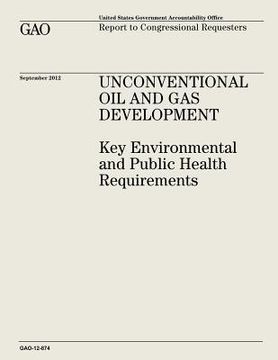Unconventional Oil and Gas Development: Key Environmental and Public Health Requirements (GAO-12-874)
Synopsis "Unconventional Oil and Gas Development: Key Environmental and Public Health Requirements (GAO-12-874)"
As with conventional oil and gas development, requirements from eight federal environmental and public health laws apply to unconventional oil and gas development. For example, the Clean Water Act (CWA) regulates discharges of pollutants into surface waters. Among other things, CWA requires oil and gas well site operators to obtain permits for discharges of produced water-which includes fluids used for hydraulic fracturing, as well as water that occurs naturally in oil- or gas-bearing formations-to surface waters. In addition, the Resource Conservation and Recovery Act (RCRA) governs the management and disposal of hazardous wastes, among other things. However, key exemptions or limitations in regulatory coverage affect the applicability of six of these environmental and public health laws. For example, CWA also generally regulates stormwater discharges by requiring that facilities associated with industrial and construction activities get permits, but the law and its regulations largely exempt oil and gas well sites. In addition, oil and gas exploration and production wastes are exempt from RCRA hazardous waste requirements based on a regulatory determination made by the Environmental Protection Agency (EPA) in 1988. EPA generally retains its authorities under federal environmental and public health laws to respond to environmental contamination. All six states in GAO's review implement additional requirements governing activities associated with oil and gas development and have updated some aspects of their requirements in recent years. For example, all six states have requirements related to how wells are to be drilled and how casing-steel pipe within the well-is to be installed and cemented in place, though the specifics of their requirements vary. The states also have requirements related to well site selection and preparation, which may include baseline testing of water wells before drilling or stormwater management. Oil and gas development on federal lands must comply with applicable federal environmental and state laws, as well as additional requirements. These requirements are the same for conventional and unconventional oil and gas development. The Bureau of Land Management (BLM) oversees oil and gas development on approximately 700 million subsurface acres. BLM regulations for leases and permits govern similar types of activities as state requirements, such as requirements for how operators drill the well and install casing. BLM recently proposed new regulations for hydraulic fracturing of wells on public lands. Federal and state agencies reported several challenges in regulating oil and gas development from unconventional reservoirs. EPA officials reported that conducting inspection and enforcement activities and having limited legal authorities are challenges. For example, conducting inspection and enforcement activities is challenging due to limited information, such as data on groundwater quality prior to drilling. EPA officials also said that the exclusion of exploration and production waste from hazardous waste regulations under RCRA significantly limits EPA's role in regulating these wastes. In addition, BLM and state officials reported that hiring and retaining staff and educating the public are challenges. For example, officials from several states and BLM said that retaining employees is difficult because qualified staff are frequently offered more money for private sector positions within the oil and gas industry.

